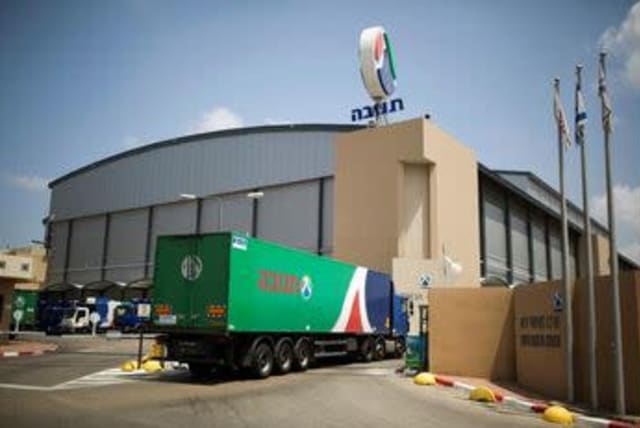Strauss, Cola, and Tnuva: Will Israel's food prices keep rising and why? - interview

While Eizenberg cautioned that it is very hard to know what may happen in the future, he predicts that the likely scenario is that prices will continue to rise in the next few months.
Strauss announced price increases for some of its non-price-controlled dairy products on Thursday. Earlier this week, price hikes were also announced by Coca-Cola and Tnuva. Gas prices and the price of price-controlled dairy products were also recently raised.
Some companies blamed hikes in the prices of their products on increases in the prices of means of production and raw materials that were caused, in part, by the Israel-Hamas war. While this reasoning was accepted by some, others did not buy it.
“Because of an increase in milk prices, Tnuva has increased the price of Schnitzel,” social lobby Lobby 99 CEO Linor Deutsch wrote Wednesday on X. “What do those have to do with each other? They don’t have to be related when you are a mega-monopoly.”
Israeli media was quick to point out that Tnuva issued a NIS 200 million dividend in January, implying that the company is turning a fine profit and that the price hikes were not actually necessary.
The real reason behind recent price hikes probably includes a number of factors, according to Prof. Alon Eizenberg, a Hebrew University of Jerusalem economist.
There is some merit to companies’ claims that the war and overall global inflation have impacted the costs faced by companies, he said.
“Globally we are still in an inflationary phase,” Eizenberg said, adding that the war may have also impacted the cost structures companies faced when they had employees in the IDF reserves, faced uncertainty about when they would receive imported raw materials, faced changes to insurance costs, and dealt with the war’s impacts on air and sea traffic.
“There are some real reasons why the cost structures [of companies] may be negatively impacted – not just by the overall global inflation but by the effects of the war,” he said.
Some companies also postponed raising prices when input prices first increased, meaning that they are now catching up, Eizenberg said.
Suspicion surrounding price hike is justified
At the same time, suspicion surrounding the reasons behind price hikes was justified, he said.
“There is a sense that perhaps these companies are simply exploiting the overall environment, which is inflationary,” Eizenberg said, adding that he was “sure that some of this is going on.”
“There is an argument to be made that when input prices were falling and the shekel was very strong, [companies] didn’t lower prices,” he said.
The war and price increases of regulated goods create an environment that enables companies to increase prices without significant backlash, Eizenberg said. Companies now have an excuse to raise prices, and together with a distracted public that does not have time to fight this, an ideal environment for price hikes is created, he said.
The war may have also reduced competition in Israel’s already concentrated markets, Eizenberg said. The negative impact of the war may have had a more significant impact on small companies, knocking them out of competition, he said. Bigger companies may have more easy access to credit, and for small companies, their entire workforce may have been drafted for reserve duty, making it impossible for them to compete. This would leave consumers with less choice and large companies with even more power in their respective markets, he added.
“The Israeli food sector is highly concentrated,” Eizenberg said. “If you look at many of the leading food categories, sometimes you have one or two players, and at most, three players in that market.”
When there is concentration and not enough competition in a market, it enables companies to raise prices without other competitors in the market selling for less and forcing prices down, he said.
“If the competitive force is very strong, then even if there are some changes, even if the cost [of inputs] goes up, sometimes you will not necessarily have to pay more as a consumer because competitive forces will kick in,” Eizenberg said.
While he cautioned that it is very hard to know what may happen in the future, he predicted that the likely scenario is that prices will continue to rise in the next few months. This is because there is currently not enough attention from the public or officials on this issue.
“Right now, I don’t see that there is sufficient attention from the public and regulators to deal with the increase in concentration and in power of large firms,” he said.
Eizenberg predicted that either public outrage at price increases that leads to boycotts of some products, or an improvement in the security situation that would free up politicians and regulators to address companies’ behavior, will lead to an eventual turning point.
Jerusalem Post Staff contributed to this report.
Jerusalem Post Store
`; document.getElementById("linkPremium").innerHTML = cont; var divWithLink = document.getElementById("premium-link"); if (divWithLink !== null && divWithLink !== 'undefined') { divWithLink.style.border = "solid 1px #cb0f3e"; divWithLink.style.textAlign = "center"; divWithLink.style.marginBottom = "15px"; divWithLink.style.marginTop = "15px"; divWithLink.style.width = "100%"; divWithLink.style.backgroundColor = "#122952"; divWithLink.style.color = "#ffffff"; divWithLink.style.lineHeight = "1.5"; } } (function (v, i) { });


